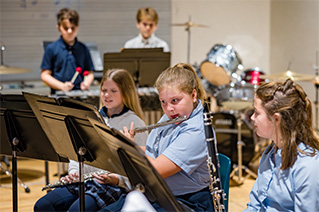Why Choose Classical Education?
Stands the Test of Time
With origins in the classical world of Greece and Rome, classical education is an ancient, proven tradition that has formed the greatest leaders, inventors, scientists, writers, philosophers, theologians, physicians, lawyers, and artists of Western Civilization.
Forms the Whole Person
A truly classical education is one that seeks to form the whole person—mind, soul, and body. Father Marquette Catholic Academy offers students a comprehensive formation: in VERITAS (truth), in FIDES (faith), and in VIRTUS (human virtue).
Embraces Truth, Beauty, and Goodness
The goal of a classical education is to form students who are truly wise and virtuous by exposing them to what is true, good, and beautiful. Father Marquette Catholic Academy offers peaceful classroom environments, displays classical and student artwork around campus, and incorporates beautiful poetry recitation into the life of the school. We are what we behold!
Emphasizes the Trivium
We seek to gift students with full and comprehensive knowledge. This approach to knowledge embraces the Trivium, which incorporates the three levels of knowledge: Grammar, Logic, and Rhetoric. We wish students to know the details of the things they are learning (Grammar), establish the relationship between the things learned (Logic), and eloquently defend well-informed opinions about those things (Rhetoric).
Adopts a Mentor-to-Student Approach
An excellent faculty is the cornerstone of any classical, academic institution. At FMCA, faculty members are not simply teachers—they are mentors and models. At Father Marquette Catholic Academy, all faculty members make an oath of fidelity to the Magisterium and invest in real relationships with each of their students.
Implements Socratic Discussion
The classical model employs Socratic discussions, whereby the teacher guides students in an analysis of ideas to discover the truth through a series of questions. This method is often employed in the liberal arts.
Implements Mimetic Instruction
The classical model also employs mimetic instruction, whereby the teacher models and facilitates a skill, and the student imitates the skill. This method is often employed in math and science.
Engages Content Lab-Rich Approach to Math & Science
Science at Father Marquette Catholic Academy is both content and lab rich. The program emphasizes a comprehensive theoretical knowledge and meaningful experience of the sciences. This quest for knowledge of God’s creation draws us to wonderment and inquiry.
Embraces “Great Books”
Father Marquette Catholic Academy immerses students in the “Great Books” of the classical and Christian intellectual tradition, allowing these texts to speak as living voices in the classroom. Learning becomes a conversation as students engage with beautiful texts.
Uses Primary Texts
Classical education prioritizes primary texts, or direct sources of information, rather than secondary texts, or indirect sources of information (such as textbooks). This is the difference between reading the Constitution of the United States and reading a book about the Constitution.
Offers Unique Courses
A classical curriculum includes instruction in many unique disciplines such as Latin, philosophy, logic and rhetoric, speech and debate, horticulture, poetry, creative writing, music, and art.
Instills Wonder and Awe in Learning
Socrates said, “Wonder is the seat of wisdom.” A classical education develops in students wonder and awe, so that they may become truly wise and life-long learners.
Individualized Student Attention
At FMCA, your child will receive individualized attention from our incredible teachers. Individualized instruction and attention are part of our Mission Statement, which is the foundation of everything we do and who we are. Administration works closely with teachers to ensure that class sizes are ideal according to each group and teacher preference. This translates into a solid foundation of learning, better test scores, higher self-esteem, and an individual well-founded in Christian values, ready to advance into high school, college, career, and life.
Borrowed from John Paul the Great Academy.

